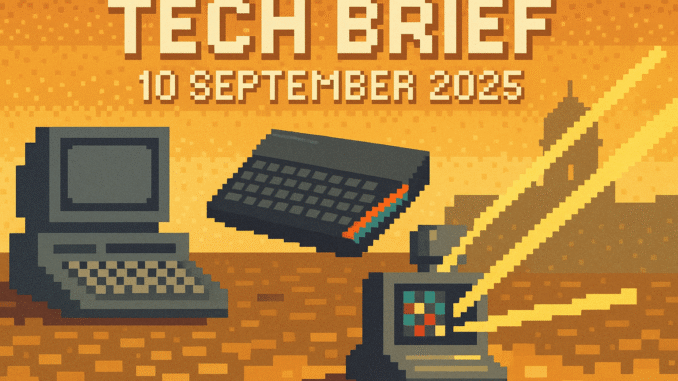
Tech Brief 10 September 2025 is your practical catch-up on the latest in optical computing, the surge in Britain’s AI sector, and the fallout from tech scandals shaking up old reputations. If you’re after a mix of technical insight, cultural memory, and a sharp eye for what’s truly new, you’re in the right place.
Missed yesterday’s Tech Brief? Catch up here before diving in.
Microsoft’s Optical Computer Revives 1940s Ideas for AI Efficiency
“This is what happens if you let the hardware designers near a museum,” a colleague joked as we read about Microsoft’s new optical computer. The project swaps electrons for photons, making calculations with light. The end goal is bold: AI that Microsoft claims could run up to 100 times more efficiently than current machines.
The striking part is the historical centrepiece. Microsoft openly cites inspiration from analogue computers dating back eighty years, when valves and switches were the order of the day. By channelling light instead of electricity, they revive ideas that predate even the IBM PC.
If you cut your teeth modding Spectrums or wiring up custom S-Video, you’ll spot kindred spirits at work here. In a world chasing “the next big thing,” sometimes it takes a sideways glance at old logic puzzles to spark actual progress.
UK AI Sector Doubles in Size, Invites a Renaissance – or Bubble?
A bold number leads today: the UK now boasts 5,800 AI companies, up from 3,100 just two years ago. Perspective Economics, working with Whitehall’s innovation department, reports this surge. It is Britain’s most dramatic tech growth since the web shifted from dialup to broadband.
Startups, giants, and everyone in between now chase algorithms and automation. This brings to mind the DIY coding explosion of the 1980s, when one bright idea plus stubbornness could change a whole industry. The difference now is that these companies need deep pockets, cloud credits, and regulatory patience, not just a mate with a tape deck.
Has it got the same raw spirit? I wonder. Or do we risk too many flash-in-the-pan ventures, like so many unloved peripherals abandoned in a cupboard? At least there’s no shortage of fresh code.
Fujitsu Faces Fallout as Horizon Scandal Triggers Major Decline
Can a single corporate misstep undo decades of reputation? Fujitsu UK is learning the hard way. Internal sources say the company expects double-digit revenue losses as the Post Office Horizon debacle slams its standing with government and industry clients.
It is a sharp fall for a firm that once boasted mainframes in half the country’s high street banks. The root is not failed technology but a “foolish display of legal machismo.” Scores of government contracts have vanished, leaving careers upended and a brand in crisis.
If the energy in the AI sector above feels relentless, here’s a bleak reminder that technology only matters if you can trust the people delivering it. My editorial notebook: pride causes more system failures than any anti-virus glitch.
Government Launches Taxonomy to Map 350 Emerging Technologies
What does it take to corral 350 different new technologies under one digital roof? Whitehall’s answer is a sprawling “taxonomy,” a way to categorise everything from quantum computing to next-gen wireless. Designed by its main science advisory body, the directory drills eight big categories into six levels of detail.
Government wants to bring order where confusion usually rules. Readers used to wrangling hundreds of floppy backups, or who recall wrangling messy folders in Windows 3.1, might get a kick from watching the civil service try to keep pace.
No claims that it will work perfectly. If past patch jobs, overlapping standards, and awkward renaming efforts taught us anything, taxonomies are only as good as the people keeping them up to date.
From the Wayback Machine
42 Years Ago Today: Apple was still months away from shipping the Lisa, announced back in January 1983. The Lisa, with its Motorola 68000 CPU, preemptive multitasking, and a mouse-driven graphical interface, aimed to change how people worked with computers. Its £7,000-plus price tag and reliability issues meant most only saw one in a showroom. Still, its mouse-powered windows and desktop logic became the blueprint for software that millions now use daily. Sometimes, ambition outpaces reliability, but the influence lasts.
Today’s Big Question
With Microsoft looking back for inspiration and the Apple Lisa’s legacy resurfacing, Tech Brief 10 September 2025 leaves one nagging question. Does innovation mean reinventing, or just looking sideways at the past and giving it fresh code? Drop your thoughts in the comments, or just dispute my favourite mouse design.
Curiosity, coffee stains, and honest questions keep this little tribe running. Keep poking at the edges. See you for tomorrow’s disk check.
Missed yesterday’s Tech Brief? Catch up here

Leave a Reply